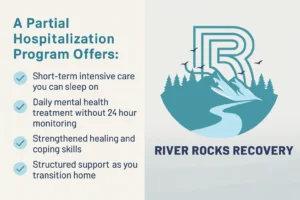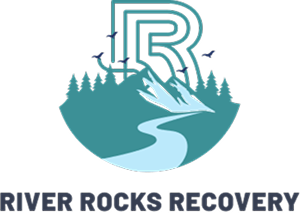Starting mental health treatment is a big decision.
It takes courage to say, I’m not okay and I need more help than what I’ve tried before.
And even after you say yes, it’s normal to wonder what exactly you’re walking into.
If you’re exploring a partial hospitalization program—whether for yourself or someone you care about—you probably have more questions than answers. What does it look like? Who is it for? How will it affect your daily life?
At River Rocks Recovery in Middletown, Ohio, we’ve supported many first-time clients who came in unsure, nervous, and unsure if it would even work. And what we’ve seen, time and again, is that when people find the right level of care, healing becomes possible—maybe even sooner than they expected.
What Is a Partial Hospitalization Program?
A partial hospitalization program, or PHP, is a short-term, highly structured treatment option that provides intensive care without requiring you to stay overnight in a facility.
It’s considered the “middle ground” of care. You’re not in a hospital. You’re not on your own with just a weekly therapy appointment. Instead, you attend treatment five days a week, for several hours each day, while returning home each evening.
PHP is often the right choice when:
- You’re struggling to manage your mental health on your own
- You’ve outgrown what once-weekly therapy can offer
- You’ve just been discharged from inpatient care and need structured follow-up
- You’re ready to do the work, but still need to stay connected to home, work, or family life
What Happens During the Day?
Your day in a partial hospitalization program is carefully designed to support every part of your emotional wellbeing. Each day usually includes:
- Individual therapy — Private one-on-one sessions to work through the deeper emotional challenges that brought you here.
- Group therapy — Support from peers who get it. You’ll practice vulnerability, boundaries, and connection—all within a safe, guided environment.
- Skills development — Learn and practice tools like emotion regulation, mindfulness, and communication skills.
- Psychiatric care — Access to medication management if needed, along with regular check-ins on your mental health symptoms.
- Case management — Help with practical aspects of life like housing, insurance, or finding long-term support after PHP.
The goal is to create rhythm and routine—a structure that supports your healing while giving you tools you can carry home.

How Is PHP Different from Other Treatment Options?
It’s helpful to understand where PHP fits in the spectrum of care. Here’s how it compares to other common mental health treatment levels:
| Level of Care | Time Commitment | Support Level | Where You Sleep |
|---|---|---|---|
| Weekly Therapy | 1–2 hours/week | Low | Home |
| IOP (Intensive Outpatient) | 9–12 hours/week | Moderate | Home |
| PHP | 25–30 hours/week | High | Home |
| Inpatient/Residential | 24/7 | Maximum | Facility |
A partial hospitalization program is ideal when you need more structure and support—but still want to live at home and keep some control over your daily life.
It’s especially helpful if you’re not in immediate danger, but your mental health symptoms are getting harder to manage.
Is PHP the Right Fit for You?
The idea of committing to five days a week of treatment might feel overwhelming. But for many people, PHP is exactly what makes recovery feel possible again.
You might be a good fit for PHP if:
- Your anxiety, depression, or mood swings are interfering with work, school, or relationships
- You’ve had suicidal thoughts but don’t need 24-hour monitoring
- You’re struggling to get through the day emotionally—even if things “look fine” from the outside
- You want more support, but not hospitalization
- You just completed inpatient care and need step-down support to maintain progress
At River Rocks Recovery, we often work with people who say things like:
“I thought I just needed a therapist, but I’m still stuck.”
Or: “I’m not in crisis anymore—but I’m not okay either.”
If this sounds like you, you’re not alone.
We also support people looking for a partial hospitalization program in Monroe, Ohio, or nearby areas. Our regional service areas include Monroe, West Chester, Dayton, and other local communities near Middletown.
What to Expect Emotionally
Starting a PHP can bring up all kinds of feelings:
Hope, fear, doubt, relief, panic, shame, exhaustion, curiosity.
We want to be honest about that—because emotional intensity is part of the process. But it’s also why PHP works.
You’re not just showing up to talk about your feelings. You’re stepping into a safe environment where those feelings are supported, understood, and worked through—bit by bit.
It’s okay to feel unsure at first. Most people do. The important part is that you show up anyway.
What Makes River Rocks Recovery Different?
Our partial hospitalization program in Middletown, Ohio is built for real people living real lives.
We understand that you may be juggling responsibilities—work, family, parenting, school. That’s why we design your treatment plan around what’s sustainable, not just ideal.
What we offer:
- Flexible schedules where possible
- Trauma-informed care from day one
- No shame, no pressure—just structure and support
- Clinicians who care deeply about your long-term wellbeing
- Treatment that respects who you are, not just what you’ve been through
If you’re looking for a partial hospitalization program in West Chester, Ohio, our team is available to help you navigate next steps, with compassion and clarity.
How Long Does PHP Last?
There’s no one-size-fits-all timeline for healing.
But most PHP stays last between 2 to 6 weeks.
We work with you to:
- Track progress over time
- Reassess your needs weekly
- Create a discharge plan that makes sense for your life
Some people step down into IOP (intensive outpatient) afterward. Others transition to weekly therapy. Some may pause treatment and return later. You’ll never be rushed—and you’ll never be alone in the decision-making.
What Happens After PHP?
Leaving PHP doesn’t mean leaving support.
We build an aftercare plan with you to make sure the transition feels steady—not sudden.
Your next steps may include:
- Intensive outpatient care
- Individual therapy
- Psychiatry or medication management
- Peer groups or alumni check-ins
- Vocational support or social services
- Continued connection to River Rocks if you ever need to return
Healing doesn’t end when the program does. It evolves.
FAQ: What People Ask Before Starting
Do I need a diagnosis to join PHP?
No. We will complete an assessment with you before starting to understand your symptoms, needs, and goals. You don’t need a formal diagnosis ahead of time.
What if I’ve never done therapy before?
That’s okay. PHP can be a great first step into mental health treatment. Many people start here and then transition into long-term care.
Will I be in therapy all day?
No. Your day includes therapy, but also skill-building, group discussions, and time for breaks and meals. It’s intensive, but balanced.
What if I’m worried about missing work or school?
Many PHP participants use short-term leave, FMLA, or flexible scheduling to attend. We can help guide you through those conversations.
Will my family be involved?
If appropriate, yes. With your consent, we can include family in education or support planning. But this is your space first.
You’re allowed to start where you are.
Call (888) 905-6281 to learn more about our partial hospitalization program services in Middletown, Ohio. You don’t have to hit rock bottom to get help—you just have to be ready for something better.

